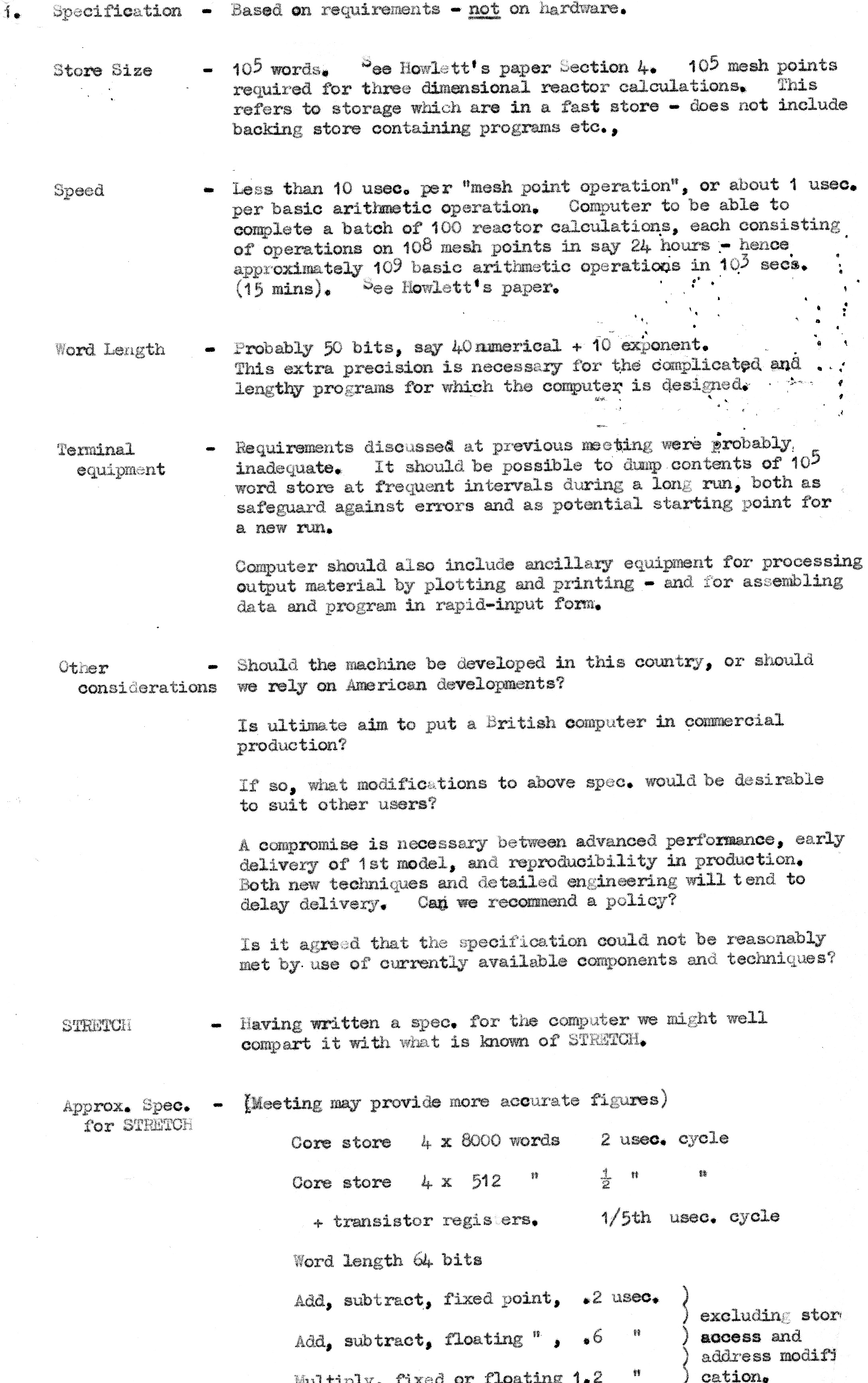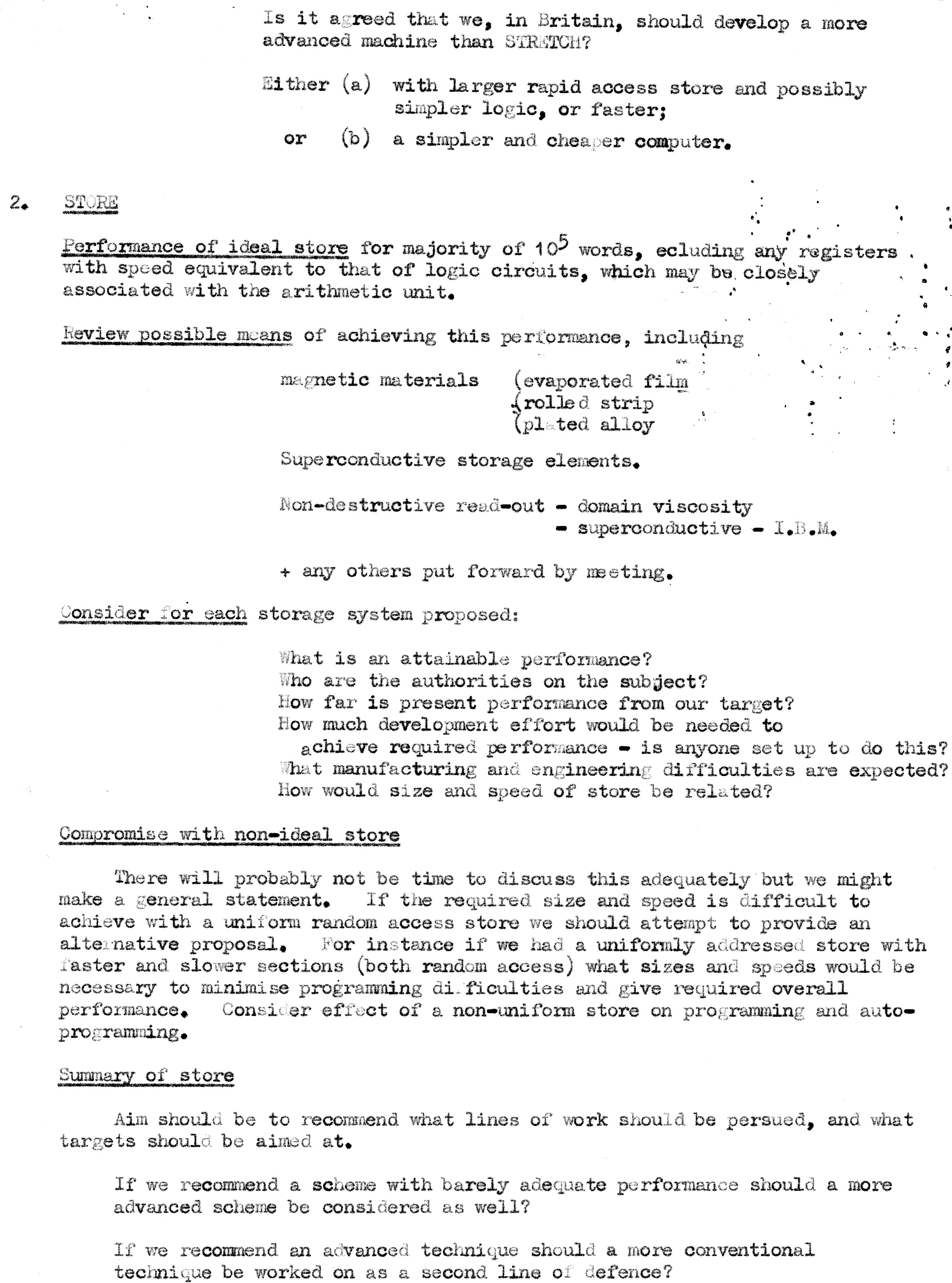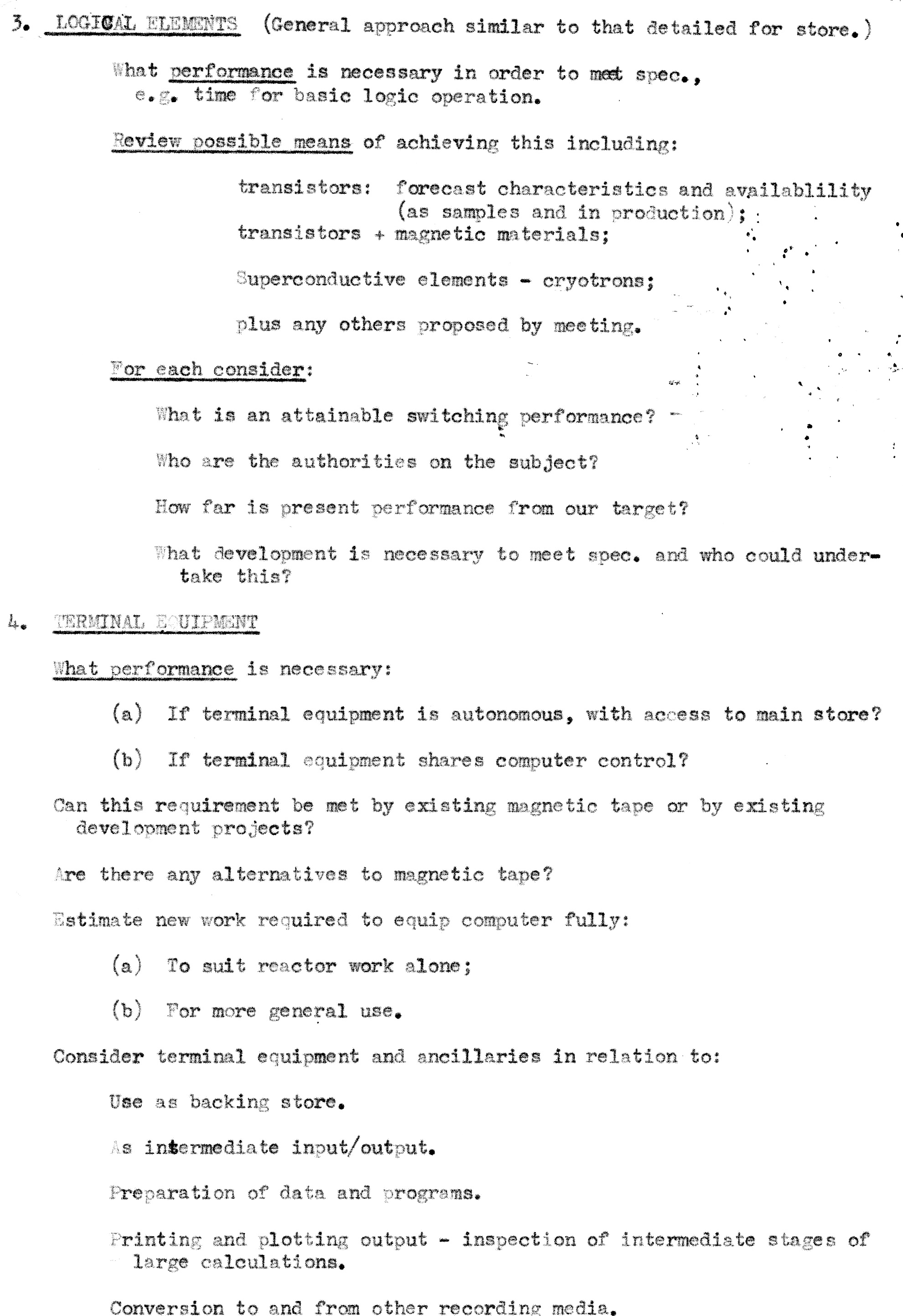3D Computer
Provenance of this document copied by Dai Edwards (dbgedwards@sky.com) on 2/10/2012.
This document was circulated with the Agenda papers for the meeting held on 27th February 1958.
The meeting was called by Sir Owen Wansborough-Jones, at that time the Chief Scientist at the Ministry of Supply.
The meeting was attended by NRDC and representatives from AERE, RRE, NPL, MOS and the Universities of Cambridge and Manchester.
There is no formal title to the specification paper.
On the last (foolscap) page [but not present on the A4 scan of this page] there is typed: E.H.C-Y 26th February 1958.
The author is therefore E H Cooke-Yarborough of the UKAEA.
1. (Atlas) Specification - Based on Requirements - not on hardware
- Store Size
- 105 words. See Howlett's paper Section 4. 10 5 mesh points
required for three dimensional reactor calculations. This
refers to storage which are in a fast store - does not include
backing store containing programs etc.
- Speed
- Less than 10 µsecs per mesh point operation, or about 1 µsec
per basic arithmetic operation. Computer to be able to
complete a batch of 100 reactor calculations, each consisting
of operations on 108 mesh points in, say, 24 hours - hence
approximately 109 basic arithmetic operations in 103 secs (15 mins). See Howlett's paper.
- Word Length
- Probably 50 bits, say 40 numerical + 10 exponent. This extra precision is necessary for the complicated and
lengthy programs for which the computer is designed.
- Terminal equipment
- Requirements discussed at previous meeting was probably
inadequate. It should be possible to dump contents of 105
word store at frequent intervals during a long run, both as
safeguard against errors and as potential starting point for a new run.
- Other considerations
- Should the machine be developed in this country, or should
we rely on American developments?
- Is ultimate aim to put a British computer in commercial production?
- If so, what modifications to above spec would be desirable to suit other users?
- A compromise is necessary between advance performance, early
delivery of first model, and reproducibility in production.
Both new techniques and detailed engineering will tend to
delay delivery. Can we recommend a policy?
- Is it agreed that the specification could not be reasonably
met by use of currently available components and techniques?
- STRETCH
- Having written a spec, for the computer we might well
compare it with what is known of STRETCH.
- Approximate Specification for STRETCH
- (Meeting may provide more accurate figures.)
- Core store 4 × 8000 words, 2 cycle
- Core store 4 × 512 words, 0.5 µsec cycle
- + transistor registers 0.2 µsec cycle
- Word length 64 bits
- Add, subtract, fixed point, 0.2 µsec
- Add, subtract, floating point, 0.6 µsec
- Multiply floating point, 1.2 µsec
- (These figures exclude store access and address modification)
- is it agreed that we, in Britain, should develop a more
advanced machine than STRETCH?
- Either (a) with larger rapid access store and possibly simpler logic, or faster;
- or (b) a simpler and cheaper computer
2. STORE
Performance of ideal store for majority of 105 words, excluding any registers
with speed equivalent to that of logical circuits, which may be closely
associated with the arithmetic unit.
Review possible means of achieving this performance, including
- magnetic materials: evaporated film, rolled strip, plated alloy
- Superconductive storage elements
- Non-destructive read-out (domain viscosity, superconductive, IBM)
- plus any other put forward by meeting
Consider for each storage system proposed:
- What is an attainable performance?
- Who are the authorities on the subject?
- How far is present performance from our target?
- How much development effort would be needed to
achieve required performance - is anyone set up to do this?
- What manufacturing and engineering difficulties are expected?
- How would size and speed of store be related?
Compromise with non-ideal store
There will probably not be time to discuss this adequately but we might
make a general statement. If the required size and speed is difficult to
achieve with a uniform random access store we should attempt to provide an
alternative proposal. For instance if we had a uniformly addressed store with
faster and slower sections (both random access) what sizes and speeds would be
necessary to minimise programming difficulties and give required overall
performance. Consider effect of a non-uniform store on programming and auto-programming.
Summary of store
Aim should be to recommend what lines of work should be pursued, and what targets should be aimed at.
If we recommend a scheme with barely adequate performance should a more advanced
scheme be considered as well?
If we recommend and advanced technique, should a more conventional
techniques be worked on as a second line of defence?
3. LOGICAL ELEMENTS
(General approach similar to that detailed for store.)
-
What performance is necessary in order to meet spec, eg time for basic logic operation
-
Review possible means of achieving this including:
- transistors: forecast characteristics and availability (as samples and in production);
- transistors + magnetic materials
- Superconductive elements - cryotrons
- plus any other proposed by the meeting
For each consider:
- What is an attainable switching performance?
- Who are the authorities on the subject?
- How far is present performance from our target?
- What development is necessary to meet spec and who could undertake this?
4. TERMINAL EQUIPMENT
What performance is necessary?
- If terminal equipment is autonomous, with access to main store?
- If terminal equipment shares computer control?
Can this requirement be met by existing magnetic tape or by existing development projects?
Are there any alternatives to magnetic tape?
Estimate new work required to equip computer fully:
- To suit reactor work alone;
- For more general use.
Consider terminal equipment and ancillaries in relation to:
- Use as backing store
- As intermediate input/output
- Preparation of data and programs
- Printing and plotting output - inspection of intermediate stages of
large calculations.
- Conversion to and from other recording media.

Page 1

Page 2

Page 3

